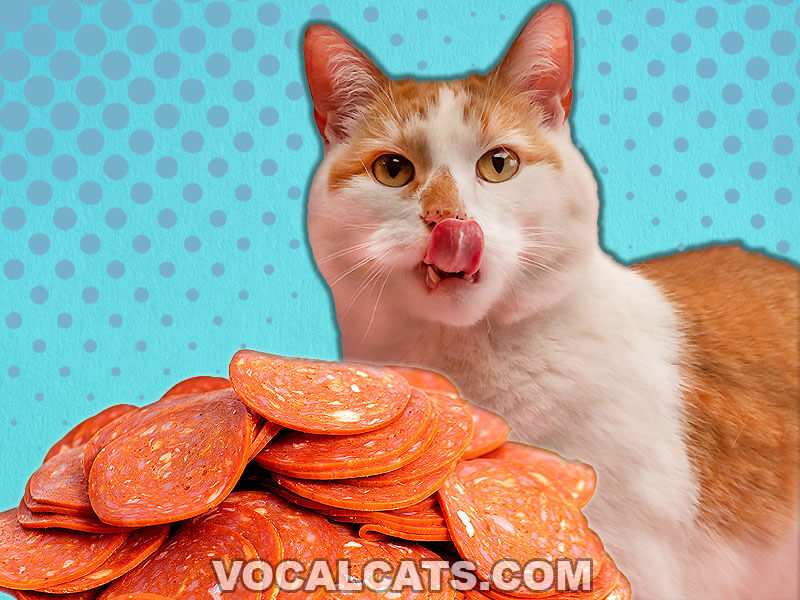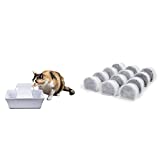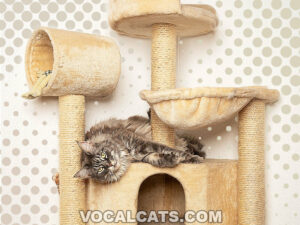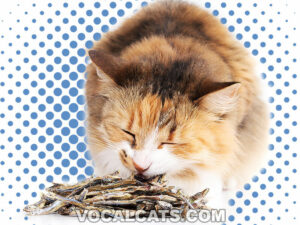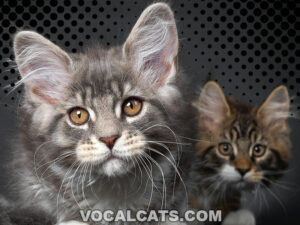Can Cats Eat Pepperoni? No, cats should not eat Pepperoni because it is a cured meat that is laden with salt and pepper. On top of those spices are preservative compounds like sodium nitrate which is toxic to cats if consumed in high amounts. Pepperoni is also loaded with fats and calories, putting our cats at risk for obesity.
Since my cat is an obligate carnivore, I often wonder, “Can my cat eat Pepperoni in moderation?” One piece won’t harm our cat but it’s not a healthy option. Though our cats should eat a lot of meat protein, it doesn’t mean that Pepperoni is one of those. On the contrary, cured meat has numerous adverse health effects such as dehydration.
If you’re like me who loves eating pepperoni pizza, avoid sharing a piece with your cat. Overconsumption of cured meats such as Pepperoni and salami is terrible for them. Keep on reading to find out why you should refrain from giving Pepperoni to your feline pal.
RECOMMENDED: Can Cats Eat Spam?
Contents
- Can Cats Have Pepperoni?
- So, Can I give my Cat Pepperoni pizza?
- Is Pepperoni Bad For Cats?
- So, Can cats eat processed Pepperoni?
- Is Pepperoni Safe For Cats?
- Can Kittens Eat Pepperoni?
- Cats And Pepperoni
- Can Cats Eat Pepperoni Pizza?
- Can Cats Have Pepperoni Pizza?
- So, Can Cats Eat Pepperoni From Pizza?
- Can Cats Eat Cooked Pepperoni?
- Can Cats Eat Pepperoni Slices?
- Can Cats Eat Turkey Pepperoni?
- Can cats have Pepperoni or salami?
- My Cat Ate Pizza! What To Do If My Cat Ate Pepperoni?
- So, Can Cats Eat Pepperoni?
- Related Questions
Can Cats Have Pepperoni?
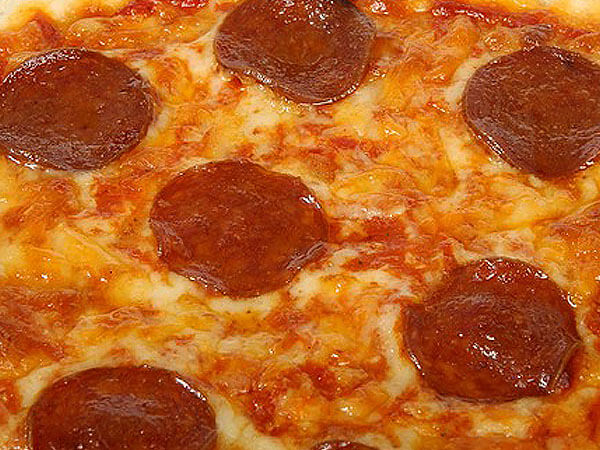
As much as I love my cat, I do not give her a slice of Pepperoni pizza. Belonging to the cured food category, Pepperoni has high levels of salt, fat, and preservatives or additives that are detrimental to our cats’ health.
Additionally, Pepperonis also contain ingredients such as garlic and onions which are toxic for our fluffy friends.
These ingredients, especially garlic, have a high concentration of thiosulphate which their bodies are unable to break down.
Later in the article, I will discuss more in-depth what the ingredients of Pepperonis are and why these are bad for our cats.
For now, I’d like first to share with you the nutritional profile of Pepperoni and why it’s not a good choice as a cat treat.
Nutritional Profile of Pepperoni (1 piece or 2 grams)
| Name, Unit | Amount |
| Calories, cal | 10.1 |
| Sodium, mg | 31.6 |
| Carbohydrate, g | 0.024 |
| Total Fat, g | 0.926 |
| Saturated Fat, g | 0.354 |
| Protein, g | 0.384 |
| Iron, mg | 0.027 |
| Calcium, mg | 0.38 |
| Magnesium, mg | 0.36 |
| Phosphorus, mg | 3.16 |
| Potassium, mg | 5.48 |
So, Can I give my Cat Pepperoni pizza?
Based on the above table showing the nutritional profile of Pepperoni, you can see that that 1 piece of Pepperoni alone is already equivalent to 10.1 calories.
Just so you know, the ideal caloric intake for cat treats should be less than 25 calories per day.
That said, 2 pieces of Pepperoni are already equivalent to 20.2 grams of empty calories.
For sodium, the ideal daily consumption for adult cats is about 42mg. The problem is just one (1) piece of Pepperoni already contains 31.6mg of sodium. That amount is very close to the daily requirements of our feline pals.
When it comes to potassium, the recommended intake should only be 0.33 grams a day. Anything more than that could result in hyperkalemia.
So, if you feed your cat with Pepperoni, you can expect health problems to show up sooner than expected.
Is Pepperoni Bad For Cats?
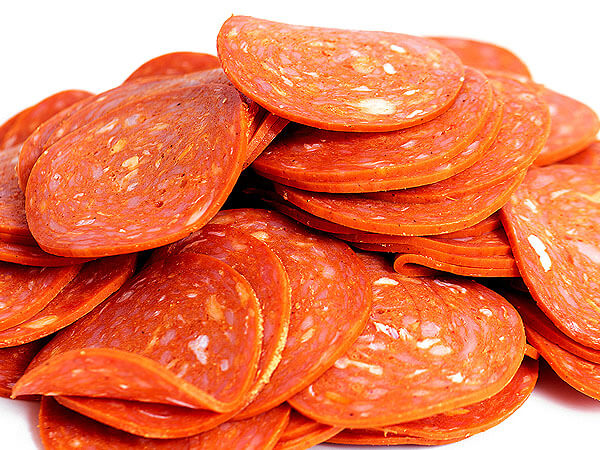
Yes, Pepperoni is bad for cats because it is a highly processed food.
So, what is Pepperoni, and what makes it processed food? And why is it so tasty but unfortunately bad for our cats?
Pepperonis are thinly sliced sausages which are made up of ground beef and ground pork. To make the meats flavorful, seasonings like salt, pepper, and paprika are added.
The meat is then cured by adding more salt, sugar, and lactobacillus bacteria to produce lactic acid for a tastier sausage.
It then goes through the process of fermentation and smoking/heating which is done by adding sodium nitrite and sodium nitrate.
Thus, it takes several steps and days to produce Pepperoni making it a highly processed food that is not good for our cats because of the following ingredients:
1. Salt
Salt is an electrolyte that cats need in their daily diet. Salt is required for body functions which include normal blood pressure and nerve functions.
But too much salt will lead to hypernatremia or an imbalance in the levels of electrolytes that causes the following symptoms:
- Increased thirst
- Disorientation
- Lethargy
- Seizures
RELATED: Can Cats Eat Saltine Crackers?
2. Pepper
A dash of pepper is OK, but too much is toxic for our feline pals. It’s because pepper contains piperine, a compound that irritates their digestive system. The symptoms are the following:
- Stomach pain
- Diarrhea
- Vomiting
3. Sugar
As obligate carnivores, our cats do not need plant-based carbohydrates like sugar. Unlike humans, cats do not produce the enzyme glucokinase which is responsible for the efficient digestion of carbohydrates.
Not to forget that excess consumption of sugar is one of the causes of feline diabetes. Aside from diabetes, regularly eating food with high sugar level can result in the following:
- Flatulence
- Indigestion
- Vomiting
- Diarrhea
4. Paprika
While paprika isn’t bad for cats because it does not contain capsaicin, anything spicy may irritate our cat’s mouth and digestive system.
SEE ALSO: Can Cats Eat Takis?
5. Cayenne Pepper
Cayenne pepper adds a robust flavor to Pepperoni but this ingredient is bad for our cats. Blame it on capsaicin, a compound that can disrupt our cats’ gut flora.
6. Garlic powder
If you think garlic powder is not potent, think again. Garlic powder contains allicin, a compound that is poisonous to cats. Any cat treats containing garlic powder such as Pepperoni are bad for them.
Small amounts of this compound can cause hemolytic anemia while too much of it is more dangerous and fatal.
The symptoms of eating too much garlic powder are:
- Increased heart rate
- Breathing difficulties and pale gums
7. Fresh garlic
Garlic is a member of the Allium family that has a high concentration of thiosulphate. This causes an upset stomach but even worse is that it damages the red blood cells. What are the symptoms of garlic poisoning?
- Drooling
- Weakness
- Anemia
- Gastrointestinal upset
8. Onions
Both raw and cooked onions are bad for cats because of the compound N-propyl disulfide. Even a small amount of onions can already cause an upset stomach.
If your cat consumes a huge amount of Pepperoni, his kidneys or liver may be damaged. Some of the symptoms of onion toxicity are the following:
- Dark urine
- Depression
- Seizures
9. Sodium nitrite
This is a chemical compound that is used to preserve meats like Pepperoni. While this ingredient is used to stop the formation of bacteria, it is toxic to our cats if eaten in large amounts.
Sodium nitrite can cause methemoglobinemia, a medical condition affecting the hemoglobin in the red blood cells.
If your feline pal feasted on Pepperoni, watch out for these symptoms:
- Rapid breathing
- Increased heart rate
10. Sodium nitrate
Cats should not consume any food that has sodium nitrate because it inhibits the flow of oxygen. Consumption of sodium nitrate may lead to the following:
- Dyspnea or shortness of breath
- Weakness
- Muscle tremors
11. Red dye 40
Food coloring is added for a bright red color. While the Food and Drug Administration or FDA approved the use of red dye 40 in both human and cat food, some cats may still be allergic to food dye which may result in the following symptoms:
- Skin inflammation
- Stomach upset
- Joint pain
- Anaphylactic shock
READ NEXT: Can Cats Eat Goldfish Crackers?
12. Monosodium glutamate (MSG)
To make Pepperoni even more appetizing, monosodium glutamate or MSG, a food additive is added.
At this time, there is no concrete evidence stating that MSG is toxic for cats.
However, some vets believe that MSG is bad for cats because it may lead to neurological and gastrointestinal issues.
DON’T MISS: Can Cats Eat Imitation Crab? Purr-suing the Truth About Surimi!
13. Risk for intestinal blockage
Pepperonis have a chewy texture which can also be a problem for our cats. If they don’t chew well and just swallow the entire piece of Pepperoni, it may result in intestinal blockage.
The common symptoms are:
- Abdominal pain
- Constipation
- Weight loss
14. Risk for obesity
A diet high in sodium, sugar, calories, fats, and preservatives puts cats at risk for weight gain. This has a ripple effect because obesity is also linked to heart and joint diseases.
15. Risk for hyperkalemia
As I mentioned above, one (1) piece of Pepperoni contains 5.48 mg of potassium but the daily needs of cats for this mineral is only 0.3mg.
So, that means consuming just a piece will result in hyperkalemia or excessive potassium in the blood.
If left unchecked or you keep on giving Pepperoni as treats, some of these symptoms will eventually show up:
- Twitching
- Muscle weakness
- Anorexia
- Abdominal swelling
So, Can cats eat processed Pepperoni?
No, cats cannot eat processed Pepperoni. While Pepperoni is loaded with protein from the pork and meat ingredients, the addition of preservatives, salt, and fat makes it unsuitable for your cat to consume.
Cats are obligate carnivores and they need to get most of their nutritional needs from a meat-based diet. Incorporating processed meats into their diet, such as Pepperoni or sausages, however, has a detrimental effect on their health.
The high salt content plus the preservatives that keep the Pepperoni from spoiling alters the microbiome in your cat’s digestive system.
This, in turn, causes chronic inflammation that eventually leads to the development of certain degenerative diseases like diabetes, heart disease, kidney disease, and cancer among other things.
Is Pepperoni Safe For Cats?
When consumed in large quantities, Pepperoni is not safe for cats. As mentioned above, Pepperoni contains several ingredients that are considered toxic to cats.
Pepperoni always has some garlic, and sometimes onions, which can be toxic to your cat if eaten in large amounts.
Most commercially prepared Pepperoni contains garlic powder, or garlic salt, which is a more concentrated form of garlic.
Less than 1/8 teaspoon of garlic powder, or less than 1/2 teaspoon of minced raw garlic, is enough to cause garlic toxicity in cats.
Some Pepperonis also contain other ingredients considered toxic to cats. These include monosodium glutamate (MSG), paprika, and Red Dye 40.
Can Kittens Eat Pepperoni?
No, kittens cannot eat Pepperoni. Kittens have a fragile and sensitive digestive system that requires a balanced diet that would support their growth and development.
Kittens have different nutritional needs compared to adult cats since their size can double or triple during this time. They also have a high energy level requiring them to get enough calories in one meal.
After a kitten has been weaned from their mother’s milk, simple solid foods should be introduced that can be easily digested.
Feeding your kitten some Pepperoni that has a high salt content can easily dehydrate a small kitten and even cause salt poisoning.
Excessive sodium in their bloodstream can give the body a hard time expelling the salt leading to serious complications such as kidney failure.
Too much salt can also deplete the body of much-needed vitamins and nutrients, like calcium, which is needed for proper bone and teeth development.
Kittens also have small teeth that may not be able to chew Pepperoni properly. Due to the drying and fermentation process to make Pepperoni, much of the moisture in the meat is lost. This results in a dense, chewy texture that a kitten may have a hard time swallowing.
Cats And Pepperoni
Popular as a pizza topping or as an appetizer, Pepperoni has become somewhat of a staple that we use to flavor our breads, sauces, and even pasta.
But, does it work well with our cat’s diet? What additional advantages, if any, does eating Pepperoni for cats provide, other than being a good source of protein?
Can Cats Eat Pepperoni Pizza?
No, cats should not eat Pepperoni Pizza. Pepperoni Pizza is not recommended in your cat’s diet or even given as a treat.
The part of the pizza that you should be concerned about is the sauce and the toppings.
The dough is mostly carbohydrates and does not offer much nutritional benefit to your cat. But, of course, feeding them too much pizza dough can cause them to gain unwanted weight.
If you are baking your pizza dough at home though, you should be aware that this is actively fermenting because of the yeast. It will continue to produce ethanol and carbon dioxide inside your cat’s stomach leading to bloating and intoxication.
In some cases, surgery may be required to remove the expanding dough.
The onions and garlic in the pizza sauce are also toxic due to the disulfides and thiosulfinates it contains that can damage red blood cells resulting in anemia.
Cheese is another ingredient you should watch out for. Cats are lactose intolerant and do not have the necessary enzymes in their intestines to digest lactose.
Ingesting large amounts of cheese can cause bloating, stomach cramps, and excessive gas.
Can Cats Have Pepperoni Pizza?
No, cats should not have Pepperoni Pizza. While a slice of Pepperoni Pizza can be a good source of protein, carbohydrates, vitamins, and minerals for humans, it is not recommended for consumption by cats.
Cats need a good source of protein where they can get essential amino acids like taurine that are needed to maintain a healthy immune system and proper heart function which a slice of Pepperoni Pizza cannot provide.
Cured meats are not a good source of protein for cats and it only causes an imbalance in their overall diet due to the excessive salts and nitrates.
So, Can Cats Eat Pepperoni From Pizza?
Due to the excessive amount of salt and nitrates in Pepperoni, cats should not eat Pepperoni from pizza. In fact, Pepperoni is not recommended in your cat’s diet, not even as a small treats.
Pepperoni can mess up your cat’s health in the long run because it also contains other ingredients like garlic and food coloring that are not meant to be consumed by cats.
Can Cats Eat Cooked Pepperoni?
No, cats should not eat cooked Pepperoni. That’s because cooked Pepperoni offers the same nutritional value as raw Pepperoni. Cats would get the same amount of salt and fat whether a Pepperoni is cooked or raw.
Can Cats Eat Pepperoni Slices?
No, cats should not eat Pepperoni slices. Pepperoni slices given as treats for your cat is also not recommended.
A slice of Pepperoni contains around 32mg of sodium which is a lot for a cat treat.
While excessive salt can be excreted through the kidneys, regularly feeding your cat Pepperoni will cause health problems over time.
Can Cats Eat Turkey Pepperoni?
No, cats should not eat Turkey Pepperoni since it contains the same ingredients as traditional Pepperonis.
While Turkey Pepperoni has lesser saturated fat and calories compared to those made from pork or beef, some brands have a higher salt content.
As discussed above, Pepperoni can abnormally increase the sodium in your cat’s bloodstream. Aside from salt, Turkey Pepperoni contains almost similar amounts of nitrates and garlic as regular Pepperonis.
Can cats have Pepperoni or salami?
No, cats should not have Pepperoni or salami. Both Pepperoni and salami contain excessive salt and nitrates that are used to cure the meat and decrease the formation of bacteria.
My Cat Ate Pizza! What To Do If My Cat Ate Pepperoni?
Should you worry if your cat accidentally ate some pizza lying around your kitchen? A little bite of pizza probably won’t do your cat any harm, but here are some negative reactions you should look out for that might necessitate a trip to the vet:
- Vomiting
- Diarrhea
- Abdominal pain
- Bloating
- Excessive thirst
- Excessive urination
- Lethargy
- Dehydration
- Loss of appetite
- Tremors
- Incoordination
- Seizures
A cat that is suffering from salt poisoning may be administered intravenous (IV) fluids to prevent further dehydration and restore the balance of electrolytes.
Fresh water should also be given in small amounts and the cat should be monitored closely for 2 to 3 days. In severe cases, hospitalization may be required.
So, Can Cats Eat Pepperoni?
While a slice of Pepperoni may not be harmful to your cat if they consumed it accidentally, feeding them this popular cured meat regularly will pose a serious threat to their overall health.
It is important to keep in mind that not all the foods we enjoy eating are suitable for our feline friends.
Pepperonis are not the best treat to feed our cats because they are often low in nutritional content. It also contains excessive amounts of salt and other ingredients that are toxic to their bodies.
To provide your cat with a healthy and vital life, it is always essential to feed them a well-balanced diet suitable for their demands.
Related Questions
No, Pepperoni is not suitable for cats and dogs. The high salt content alone can cause vomiting, diarrhea, and in severe cases, salt poisoning. Pepperoni also contains ingredients that are toxic to cats and dogs, such as garlic and peppers. These two herbs cause red blood cell destruction that may eventually lead to anemia.
No, cats should not eat cheese because they cannot properly digest lactose, a sugar found in milk and other dairy products. Cats are lactose-intolerant because they do not have the enzyme called lactase in their intestines that can break down this sugar. Cats that ingest cheese may suffer symptoms like diarrhea, vomiting, and abdominal pain.
DISCLAIMER: THIS WEBSITE DOES NOT PROVIDE MEDICAL ADVICE
The information, including but not limited to, text, graphics, images and other material contained on this website are for informational purposes only. No material on this site is intended to be a substitute for professional veterinary advice, diagnosis, or treatment. Always seek the advice of your veterinarian or other qualified health care provider with any questions you may have regarding dietary needs.
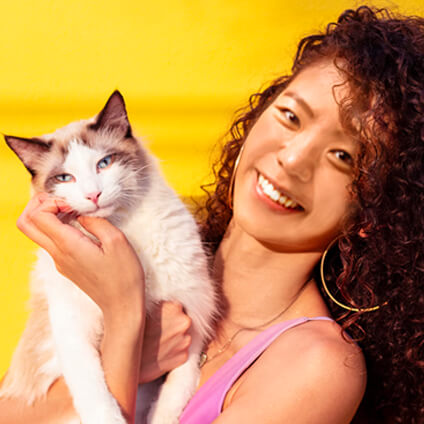
With over five years of specialized experience as an animal writer, my expertise lies in cat nutrition, health, behavior, grooming, and training. I am dedicated to delivering helpful and informative content that caters to the well-being of our feline friends. My primary goal is to empower pet owners with knowledge and ensure our feline companions thrive in health and happiness. In my free time, I love volunteering at local cat rescue centers.
